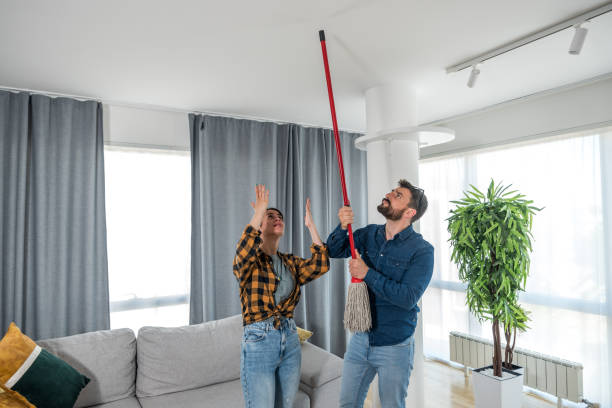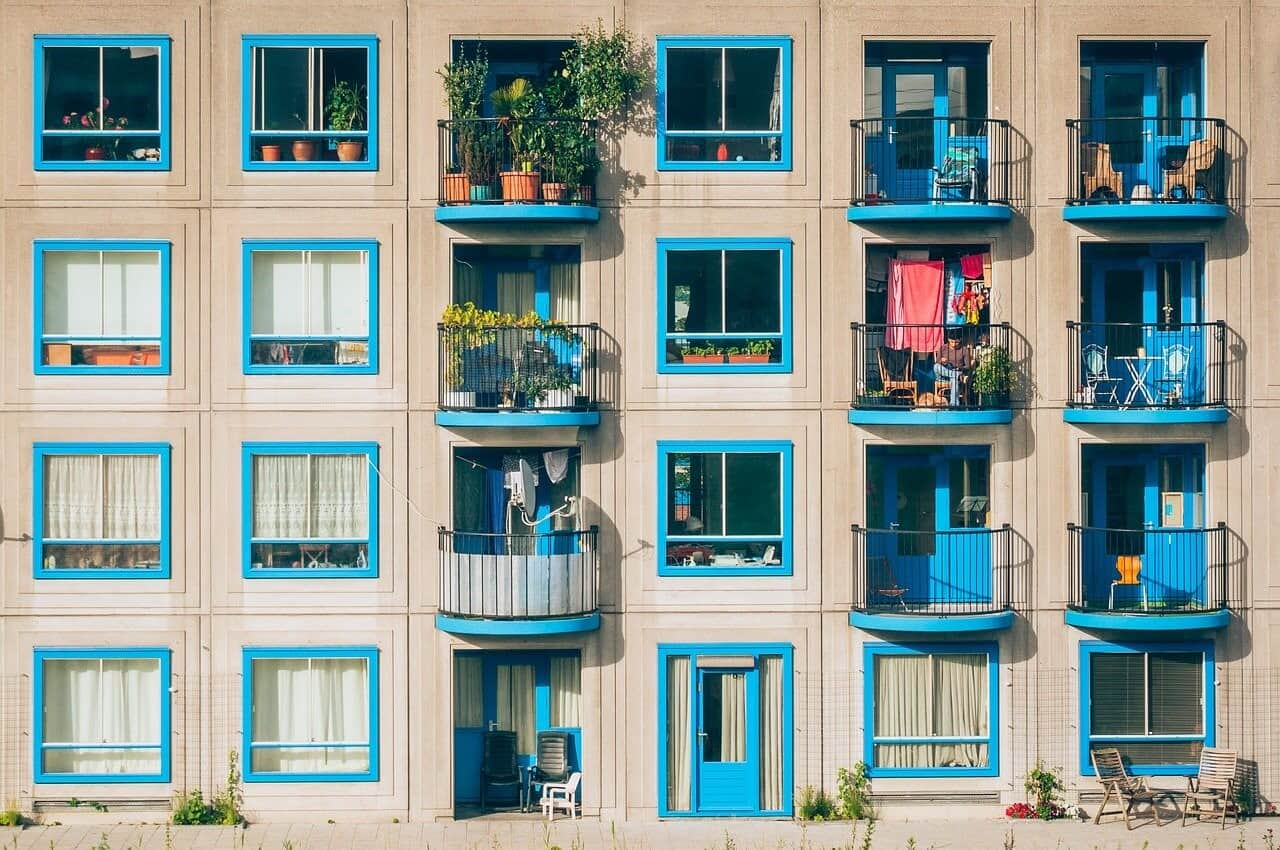Apartment living comes with some compromises. Unlike private dwellings, where you are likely to have a good distance between you and your next door neighbors, apartments are much closer, and renters are frequently subjected to noisy neighbors.
If you live in a noisy apartment, you may find it difficult to get the sleep and rest you need. This is especially true if your noisy neighbors have been partying, playing loud music, or just simply making noise all night.
Talk to your neighbors about the apartment noise and see if they can try to appease your requests. If that does not work, formally write a letter requesting that they stop the noisy behavior. If this still fails, document all of the instances of noise and take it to your landlord.
How to Deal with Noisy Apartment Neighbors

Nobody wants their lives to be disrupted by excessive noise in their living spaces. As a result, you must take whatever steps are necessary to live a life free of noise from your neighbor.
How can you deal with a rowdy neighbor who keeps blaring music during quiet hours? We have put together several things you can do to live a life free from noisy tenants. So, let’s dive in!
Be Diplomatic and Try to Talk to Your Neighbor
Sometimes, the best way to solve a problem is to talk it out. That is why it is important to bring up any noise problem with your neighbor before taking any actions that might worsen the situation. In some cases, the noise during quiet hours may not be as big of an issue as you think, and you could find a way to work it out together.

With that said, you should talk to your neighbor first to avoid being perceived as a “bad” person and causing friction between the two of you. The most important thing to keep in mind when addressing the problem is to make sure that the other person knows that you are doing this because you care about them, not because they are a bother to you.
If you have a passive aggressive neighbor, consider taking a different action, like reporting the violations to the landlord.
Document the Noise Disruption
If you talk to your neighbor and things, do not seem to be going as planned, document the noise events before further actions. To document the noise complaints, make a time-stamped log of when and for how long the noise happens during each instance. This way, you will be able to keep track of the noise and how long it lasts.

For example, documentation may look like this: on March 27th, 2022: continuous loud music was played from 7:00 AM-4:00 PM. Record the noise disturbances to gather enough evidence before taking the step to report to the property manager.
Consult with Your Other Neighbors
Having a rowdy neighbor can be frustrating, but it is important to establish whether your other neighbors are experiencing the same problem before taking any action. Talk to your neighbors about their experiences and see if they are willing to help find a solution. You may be surprised to find that there is an issue with the exterior of your building that you were not aware of.

When compared to submitting a noise complaint on your own, filing noise complaints alongside neighbors can be more meaningful, thus more successful.
Contact Your Property Manager
Armed with the evidence you documented, contact your landlord and inform them about your noisy neighbor. Let them know that you have done everything possible to address the problem on your end in a manner that does not violate any terms of your lease or apartment rules.

The landlord shall then resolve the noise complaint per the lease terms. Since every renter has the right to quiet enjoyment, many apartment communities include this “quiet enjoyment” provision in their lease agreements or and/or community rules, both of which are signed by all tenants prior to moving into the apartment.
The quiet enjoyment provision usually specifies the hours during which the renter must be silent or not disturb the other tenants in any way. Sometimes it could be the same as the city’s noise ordinance laws.
Avoid Calling the Police
Avoid getting the police involved! If you do, make sure it is the absolute last resort. The last thing you want to do is to start your new neighbor’s relationship by calling the police because they are playing their music too loudly.

The truth is that sometimes it can be difficult to know when you should call the police or not, especially when you have just moved into a new neighborhood. If they are making too much noise on their property, do not jump to conclusions and call the police on them. You may come off as rude and unreasonable if you do not take the time to evaluate the situation properly.

If they are making too much noise on their property, personally ask them to be a little quieter. With that said, before you dial that local non-emergency number, take time to engage your neighbor and try to come to an agreement.
Try Ceiling Clouds and Acoustic Fixtures
Ceiling clouds absorb sound waves by creating a physical barrier between your apartment and your upstairs neighbors. It can also create a more visually appealing environment with its soft, cloud-like appearance.

These acoustic panels can be used in any room, including offices, conference rooms, classrooms, cafes, and more. With that said, before adding ceiling clouds, make sure you get permission from your landlord; otherwise, you can lose what is a security deposit for an apartment when you move-out.
Seal the Windows
If you have ever felt like your room is too loud, it is not just your imagination. The noise from the outdoors can penetrate through the smallest gaps in the window seal and cause havoc on your sleep.

The best way to prevent this is by ensuring the window frames are well caulked and sealed. So, before you file a noise complaint, think about how well your windows are sealed. You may be surprised to find out the noise levels are not as bad as you first thought.
Seal the Doors
Loud neighbors do not always cause noise; sometimes, a gap under your door can be the root problem of the noise level you experience. These gaps allow sound waves to travel from one room to another, and amplify.

Gaps are usually created when there is a change in flooring, such as hardwood floors to tile. This can be fixed by caulking between the door seal and the floor or by replacing the gasket, as long as it is still in good shape. Learn more ways on how to soundproof an apartment door here.

As a result, before confronting your loud upstairs neighbors, make sure the area beneath your door is fixed. If your downstairs neighbor continues to make excessive noise, you should consider knocking on their front door and conversing with them.
Hang Wall Art and Tapestries
Wall hangings and tapestries are porous, making them an excellent way to absorb sound. Wall hangings have been used in acoustically sensitive spaces, such as recording studios, music halls, and libraries, to provide a quieter atmosphere. You can simply apply the same and avoid the noise disruption from your next door neighbor.

Mask the Sound with a White Noise Machine
A good way to avoid noise in your downstairs apartment building is to use sound masking and noise cancellation. These inexpensive, low-maintenance white noise machines can be the perfect remedy for noisy tenants.

Relocate to Another Apartment
If you live in a noisy apartment complex and have exhausted all options for noise reduction, you may want to consider relocating. Moving can be costly, but it is frequently the only way to get away from noisy neighbors. This is usually not an easy decision, but it may be necessary in some cases.

Additionally, you can request that your landlord consider any rent that has been paid for that month, though it is unlikely that you will get it back.
Since relocation can get expensive, we recommend trying cheaper alternatives, like investing in noise canceling headphones. It may not fully solve the problem, but it is much more cost-effective compared to relocating.

Tips for when Looking for an Apartment for Rent
You will not be able to fall asleep if your neighbors are making a lot of noise, so before you sign a lease, take the time to assess the noise issues that your neighbors are having.
Also, when figuring out how to choose an apartment complex that you will love, be wary of what is above you. Make sure you know what is the top floor apartment and what is directly on top of you, whether it is a gym or something else. You will have a difficult time being under a gym, for example, because the noise and disruption can be overwhelming.

Frequently Asked Questions
Can I sue my neighbors for noise violations?
The simple answer is yes, you can sue your neighbor for a noise violation. One of the most prevalent conflicts between neighbors is noise disturbance; however, you must use caution while pursuing legal action. It may be worth it to have a lawyer review the lease regarding the noise ordinance provision, however, before moving forward with any legal action.

Can I cancel my lease early due to noisy neighbors?
Yes, it is possible to break a lease without penalty. However, it is important to go through your lease agreement and consult with your attorney about the noise laws. Besides, you need to have enough evidence about your noise claims when approaching your landlord or management team.

With that said, make sure you have a paper trail of your effort to address the noise disturbance from your neighbors. All of this will certainly help your case.
Final Thought
There are a number of potential scenarios for noise issues when renting an apartment. For example, you may have a neighbor who plays loud music at night, waking you up, or someone who is constantly bickering with their spouse, interfering with your job, if you work from home.

These things disturb your peace, so you must take the required efforts to eliminate the noise pollution. However, it is critical to avoid exacerbating the noise issue and making it worse than it already is.









